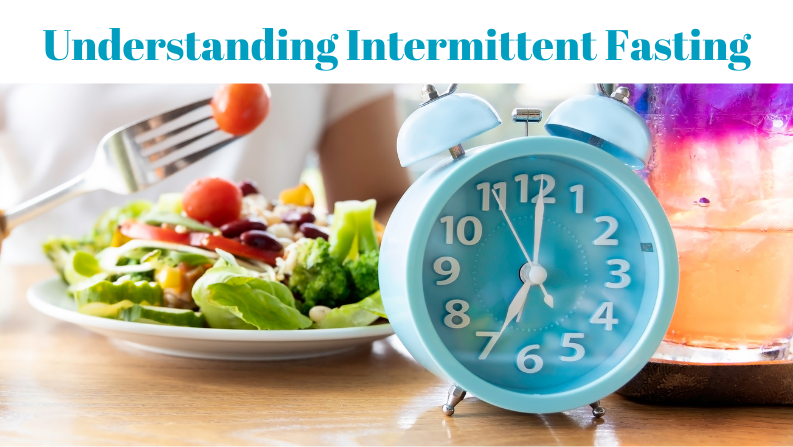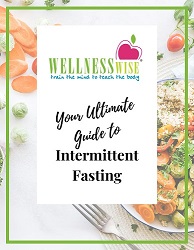So was I! Intermittent fasting is trendy, but the question is will it work for you to get healthy? As you are probably aware, there are so many different diets out there that claim to help with weight loss and disease prevention: low-fat, low-carb, keto, paleo, whole 30, vegetarian, vegan, DASH, Mediterranean, MIND. You get the idea, there are a lot of diets out there. Okay so today let’s get to it and talk about intermittent fasting.
I have talked about intermittent fasting in my Facebook Group a few years ago but since I have been hearing more about it lately, I thought I would research it a bit more and try it for myself (although honestly, I don’t like the terminology.) Keep reading to get a better understanding, learn the facts about it and what my experience has been.
The catch with Intermittent fasting…
You may be used to eating three meals every day, plus snacks. That’s pretty common. With intermittent fasting you can essentially eat how much of whatever you want—but here’s the catch: you have to stay on schedule. With intermittent fasting there are scheduled periods of time when you can eat and others when you don’t. When you don’t is considered the fast. Unlike most other diets, intermittent fasting tells you when to eat, not what to eat.
And some say that it can help lead you to better health and a longer life. Now who doesn’t want hat?
So, let’s get into some of the pros and cons of intermittent fasting.
Intermittent fasting 101
Most of the diets that help achieve weight loss work by reducing the number of calories consumed. Intermittent fasting does the same thing, but in a different way. This way of eating significantly limits calories (requiring fasting) for certain durations of time (intermittently), while allowing little or no restrictions the rest of the time.
Intermittent fasting essentially means eating and not eating during a specific window of time. There are a few different approaches:
- Time-restricted eating—Having all your meals during an 8-to-12-hour window each day, drinking only water the rest of the day.
- Alternate day fasting—Eating normally one day but only a minimal number of calories the next; alternating between “feast” days and “fast” days.
- 5:2 eating pattern—Consuming meals regularly for five days per week, then restricting to no more than 600 calories per day for the other two. This happens by eating very little and drinking only water on those two fasting days.
- Periodic fasting—Caloric intake is restricted for several consecutive days and unrestricted on all other days. For example, fasting for five straight days per month.
Benefits of intermittent fasting
Studies show that intermittent fasting can achieve weight loss. The success is similar to other diets. Yes, similar—not necessarily better.
Overall, research on the effect of intermittent fasting on people’s health is still emerging as to whether, in addition to some weight loss for some people, it can also prevent disease or slow down aging.
Most of the research on calorie restriction and intermittent fasting have been conducted in cells (e.g., yeasts), rodents, and even monkeys. Some, but not all of these studies show it may help to build exercise endurance, immune function, and live longer. It also seems to help resist some diseases like diabetes, heart disease, certain cancers, and Alzheimer’s. These are the lifestyle diseases I talk about fairly regularly. We are trying to prevent these.
Human research on intermittent fasting
When it comes to clinical studies (those done in people) on intermittent fasting, most have been pretty short—a few months or less. But what the research so us so far is that it may help with markers of inflammation (C-reactive protein), diabetes (blood glucose levels and insulin sensitivity), and help to reduce high blood pressure and cholesterol.
When it comes to weight loss, intermittently fasting seems to work just as well—not better—than other diets. Researchers think that eating this way decreases appetite for some people by slowing down the body’s metabolism. With a smaller appetite, you simply eat less and that is going to help you lose weight. But some struggle with the fasting days, and some animal studies show that when they were allowed to eat as much as they wanted, many overate.
What about extending the lifespan of humans? There isn’t the research to support that yet. We simply don’t know the effects of intermittent fasting on our lifespan.
How intermittent fasting affects health
Naturally, our bodies have survival mechanisms allowing us to adjust to periods of fasting. This has been necessary, as throughout history, humans have endured many periods where food was scarce.
What happens when we don’t take in sufficient calories is that our body starts using up stored carbohydrates called glycogen. The liver stores enough glycogen to last about 12 to 16 hours before it runs out of fuel. Beyond 16 hours, the body switches fuels and begins to use fat as an energy source.
At this time, our metabolism shifts from a carbohydrate-burning state to a fat-burning state. Some of the fat is used directly as fuel, while some is metabolized into biochemicals called ketones. This new fat-burning metabolic state is called ketosis. The state of ketosis brings on other changes throughout the body. It’s these changes that are thought to underlie some of the health benefits seen with intermittent fasting.
Ketones for energy
Ketones are a more efficient source of energy for our bodies than glucose is and so they can help keep many of our cells working well even during periods of fasting. This is particularly true for brain cells, and this may be part of the reason some animal studies show protection against age-related declines like Alzheimer’s.
Ketones may also help to ward off some cancers and inflammatory diseases like arthritis. They are also thought to reduce the amount of insulin in the blood which may help protect against type 2 diabetes. On the other hand, too many ketones may be harmful, so more research is needed to better understand the links between fasting, ketones, and health.
On a molecular level, intermittent fasting may extend lifespan in animals because of its effect on the DNA in our genes. Over time as we age, the way our genes are switched on and off changes. It appears that, in animals, restricting calories may slow down these age-related changes and help them to live a bit longer.
More research is underway to better understand the effect of fasting on these biological processes.
Before you start intermittently fasting
As with all major dietary changes, be sure to discuss it with your healthcare professional. Let’s chat to see if intermittent fasting is right for you.
Before considering intermittent fasting, know that there are certain conditions that can make it dangerous. For example, if you have diabetes you need to eat regularly to maintain your blood sugar levels, so fasting is not recommended. Also, if you’re taking certain medications like diuretics for high blood pressure or heart disease, intermittent fasting increases your risk for electrolyte abnormalities.
Intermittent fasting is also not recommended for anyone who is under 18, has a history of eating disorders or anyone who may be pregnant or breastfeeding.
Of course, whenever you change your diet, you may experience side effects. Some side effects of people who restrict their calories or start intermittently fasting include fatigue, weakness, headache, and a reduced ability to maintain body temperature in cold environments.
Beyond the health risks and side effects, fasting is simply hard to do voluntarily—especially when it’s for two or more days. Some people may have a natural tendency to indulge too much on their “feast” days which can negate some of the benefits of fasting.
According to the National Institutes of Health, “More research will be needed to determine the long-term impact of the diet on human health and provide information on when and how such a diet might be applied.”
Nutrition tips
Depending on the type of intermittent fasting you choose to try, it can be hard to stick to. One thing that can help is having a social support network—especially if you are not eating a regular amount of calories each day. For those days when you’re fasting you need people around you that support your desire not to eat.
Although the premise of intermittent fasting is to restrict when you eat, not what you eat, the quality of your food choices is still very important. Regardless of your eating style and preferences, you still need all of your essential nutrients. Intermittent fasting is not a good reason to eat a lot of the high-calorie nutrient-poor foods we all sometimes crave. I recommend eating adequate amounts of lean proteins, healthy fats, fruits, vegetables, legumes, and whole grains. Also, avoid too many sugars and refined grains. You know, whole foods mostly plants!
Final thoughts on intermittent fasting
The main reason for any dietary change is to have a sustainable and healthy lifestyle that helps you meet your health goals. Whether you’re looking to lose weight or prevent disease, intermittent fasting is one eating style that may work for you. The most important thing with any diet is to get all the essential nutrients, appropriate amounts of food, and enjoy your lifestyle in the long run.
Any diet or eating pattern that helps some people may not have the same effect on everyone. What works for that influencer on Instagram may not work for you. That’s why it’s important to not make any significant dietary changes without consulting your healthcare professional or dietitian.

My experience with intermittent fasting
At the beginning of this post, I said I would share my experience with intermittent fasting and here is my story.
I had been reading research, mainstream health magazine articles and books about how intermittent fasting could help with brain health, menopausal weight gain, reducing risk of type 2 diabetes and reducing risk of heart disease. I’d been seeing on social media and listened to a few well know doctors that were talking about the benefits of fasting intermittently. Okay so I thought if I am seeing so much about it, I need to try it to see if this is something I should be recommending.
Based on my own research, I decided to try time restricted eating. My eating window would be 10 hours and my fasting would be for 14 hours. I decided to stop eating by 7 pm. For me, this is basically not eating after dinner. (I think my mom’s advice to me when I was a teenager was not to eat after supper, so this is old school for me.)
While I’m not one to focus on the number on a scale, I decided to keep track of my weight before I started this eating style since weight loss is a common reason people want to try intermittent fasting. Weight loss has also be a focus of my coaching for many years.
At the time of this post, I have been eating this way for about a month.
Week #1:
- I didn’t find getting started to be too challenging. I don’t mind not eating after dinner. The hard part was actually getting dinner made and eaten before 7 pm.
- I find that I sleep a little better when I haven’t had any after dinner snack, so this seems like a good thing to keep going with.
- My weight dropped by half a pound.
Week #2
- I feel like I am not eating enough during the day.
- Two days this week my fasting window went to 16 hours, and I felt sick to my stomach. Let’s talk morning routine struggles but that is a topic for another post.
- On the weekend, I went to a gathering and ate much more foods that are not in my normal diet. This proves the me that what you eat is just as important as when you eat.
- My weight did not change this week.
Week #3
- All seven days I followed not eating after 7 pm and eating my breakfast at 9 am.
- I am eating 3 meals and snacks throughout the day. I am not skipping any meals.
- I’m feeling good. My energy level is good.
- My weight dropped by one pound.
Week #4
- One day this week dinner was later than usual, so I pushed my eating time to start at 10 am. I did not find it to be a problem. Only when I push the fasting longer than 14 hours do I feel lousy.
- Eating good food and anything I want within the eating time. My desire to eat not so good for me foods has diminished. (I had been craving candy in the mid afternoon most days before this experiment.)
- Watching tv with commercials in the evenings has been challenging. Pizza commercials and fast-food commercials really got my attention. I did not do anything other than notice that there were a lot of food commercials this week.
- My weight is down another pound.
Based on my experience I think I will continue with this style of eating. Although I think I will just call it not eating after dinner. If something comes up that I will be eating later than 7 pm and I need to shorten my fasting window for a day, that is okay with me. My overall impression is that I’m feeling good. I am eating good for me food and doing right with my health. If you think intermittent fasting might be something you want to try and are looking for help, encouragement, and accountability, email me to schedule an appointment to see if we are a good fit to work together with one of my online programs or personal coaching.


